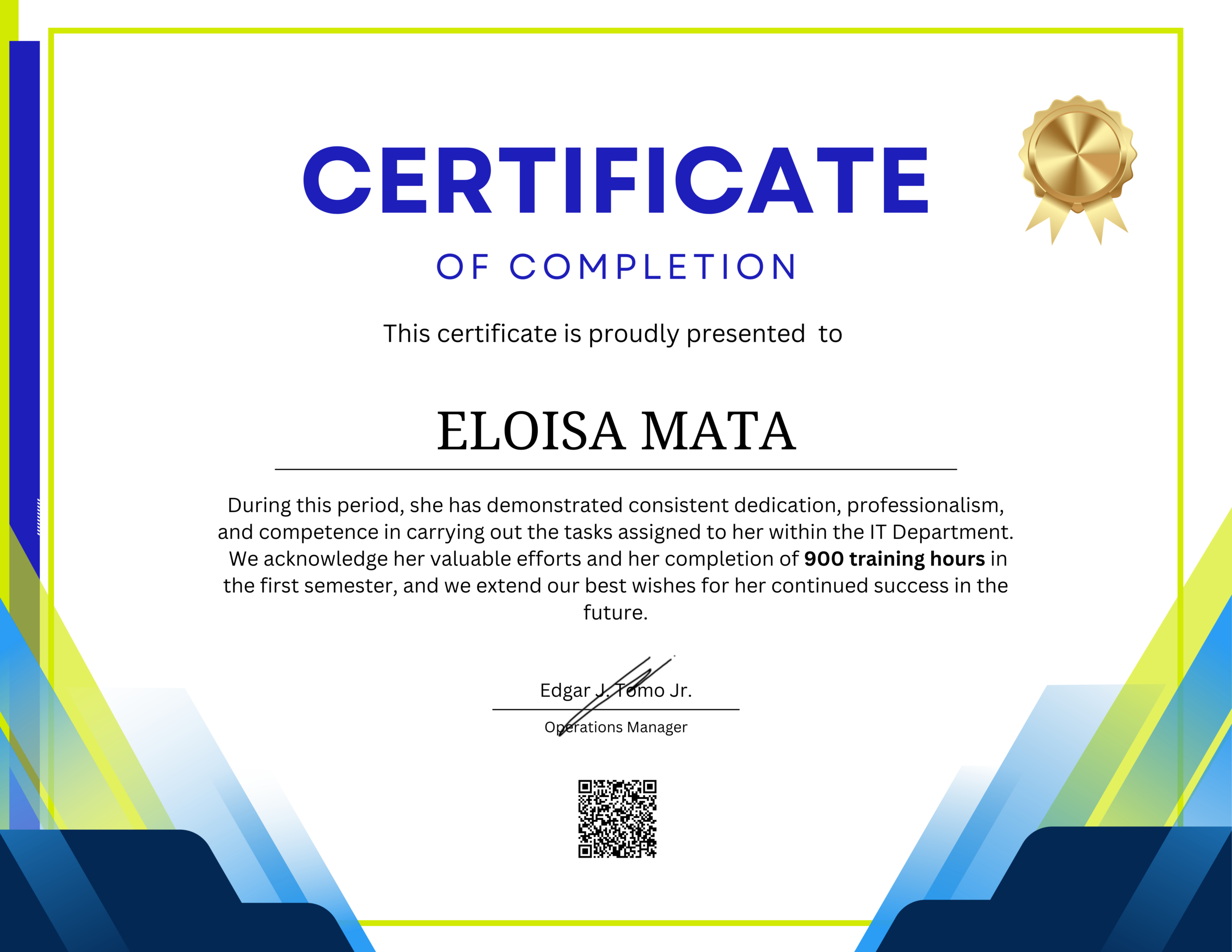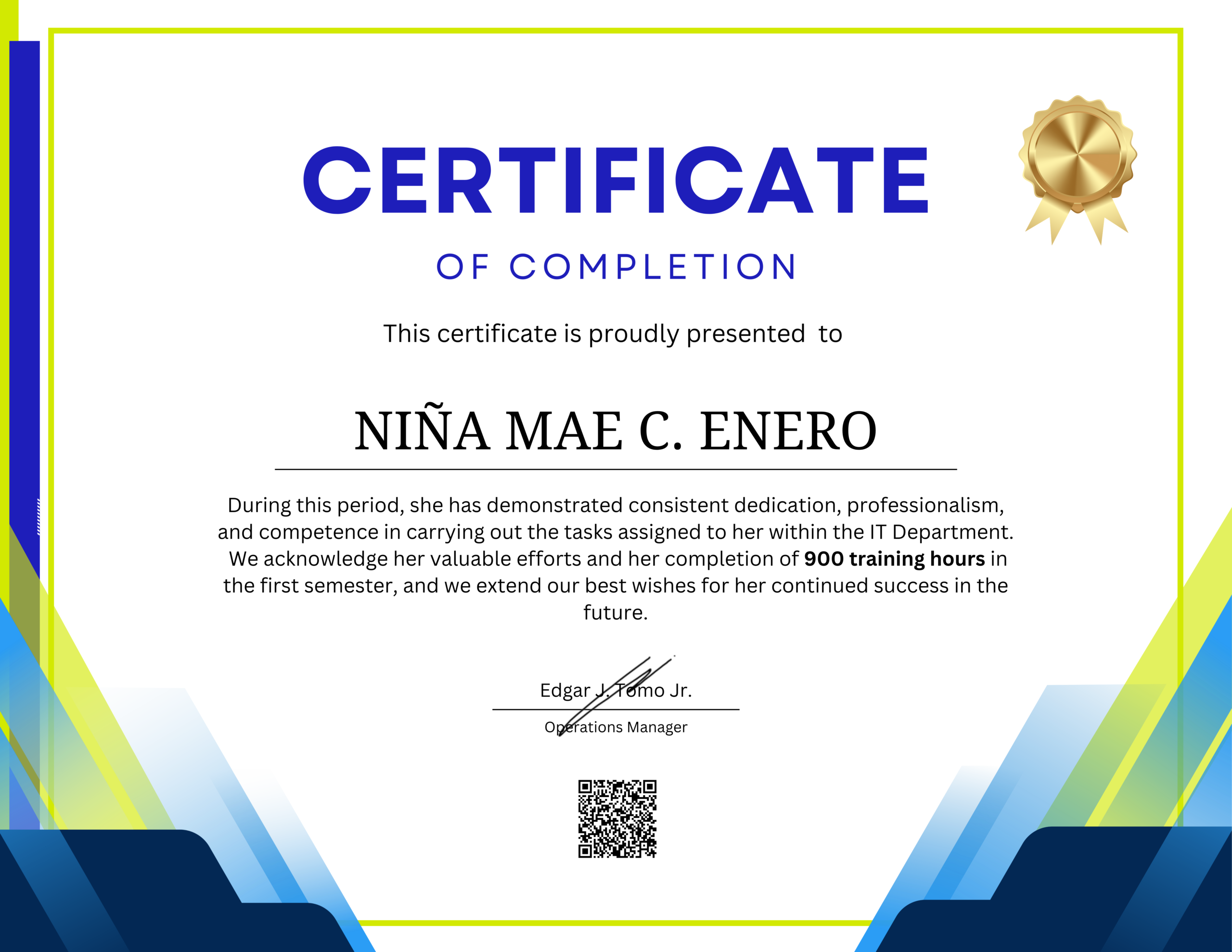The On-the-Job Training Experience of Niña Mae C. Enero Acknowledging Dedication in IT On-the-Job Training. During her on-the-job training period, she demonstrated consistent dedication and a strong sense of responsibility in fulfilling …
Exploring the Future of CCTV Surveillance Trends and Innovations.

Introduction
In an era defined by rapid technological advancements and the ever-evolving landscape of security concerns, Closed-Circuit Television (CCTV) surveillance remains a cornerstone of modern security infrastructure. From its humble beginnings as a means to monitor industrial processes in the mid-20th century, CCTV has emerged as a ubiquitous tool for crime prevention, public safety, and asset protection. However, as we peer into the future, the trajectory of CCTV surveillance is poised to undergo significant transformations driven by innovation, technological breakthroughs, and shifting societal dynamics.
This article endeavors to delve into the forefront of CCTV surveillance, examining emerging trends, cutting-edge innovations, and the implications they hold for businesses, governments, and society at large.
Evolution of CCTV Surveillance
To understand the future of CCTV surveillance, it’s imperative to trace its evolution. The journey of CCTV began with analog systems characterized by bulky cameras, limited resolution, and rudimentary recording capabilities. However, the advent of digital technology revolutionized the landscape, ushering in an era of high-definition imaging, remote monitoring, and advanced analytics.
Today, modern CCTV systems leverage a plethora of technologies including Artificial Intelligence (AI), Internet of Things (IoT), cloud computing, and advanced analytics to deliver unparalleled capabilities. These systems are not merely passive observers but intelligent sensors capable of detecting anomalies, identifying patterns, and facilitating proactive responses.
Emerging Trends in CCTV Surveillance
1. AI-Powered Video Analytics
AI is poised to be a game-changer in CCTV surveillance, enabling real-time video analytics for automatic threat detection, behavior analysis, and facial recognition. Machine learning algorithms can sift through vast amounts of footage to identify suspicious activities, potential security breaches, or operational inefficiencies.
2. Integration with IoT Devices
The integration of CCTV systems with IoT devices such as sensors, access control systems, and smart appliances enhances situational awareness and enables a more holistic approach to security management. For instance, CCTV cameras equipped with environmental sensors can detect smoke, gas leaks, or temperature anomalies, triggering immediate alerts and response actions.
3. Cloud-Based Surveillance Solutions
Cloud computing has democratized access to advanced surveillance capabilities, allowing organizations to store, manage, and analyze video data remotely. Cloud-based CCTV solutions offer scalability, flexibility, and cost-efficiency, making them ideal for businesses of all sizes.
4. Enhanced Privacy Protocols
As concerns over privacy and data protection mount, there’s a growing emphasis on implementing robust privacy protocols in CCTV surveillance systems. Technologies such as anonymization, encryption, and user access controls are becoming standard features to ensure compliance with regulatory requirements and safeguard individuals’ rights.
Innovations Shaping the Future of CCTV Surveillance
1. 3D Imaging and LiDAR Technology
Traditional CCTV systems capture images in two dimensions, limiting their ability to provide spatial awareness. However, emerging technologies like LiDAR (Light Detection and Ranging) enable the creation of 3D models, allowing for more accurate object detection, depth perception, and scene reconstruction.
2. Edge Computing for Real-Time Processing
Edge computing involves processing data near the source of generation rather than relying on centralized servers. In the context of CCTV surveillance, edge computing enables real-time video analysis at the camera level, reducing latency, bandwidth usage, and dependency on cloud infrastructure.
3. Biometric Identification and Behavioral Analysis
The convergence of CCTV surveillance with biometric identification technologies such as fingerprint scanning, iris recognition, and gait analysis holds immense potential for enhancing security and access control. By leveraging unique physiological or behavioral traits, organizations can strengthen authentication mechanisms and mitigate the risk of unauthorized access.
4. Autonomous Drones for Aerial Surveillance
Drones equipped with high-resolution cameras and AI algorithms are increasingly being deployed for aerial surveillance purposes. These autonomous drones can patrol large areas, monitor remote locations, and provide valuable insights from vantage points inaccessible to traditional CCTV cameras.
Implications and Challenges
While the future of CCTV surveillance is brimming with possibilities, it also presents a myriad of challenges and ethical considerations. Privacy concerns, algorithm biases, data breaches, and regulatory compliance are among the foremost challenges that organizations must navigate as they embrace advanced surveillance technologies. Moreover, the proliferation of CCTV surveillance raises questions about the balance between security imperatives and individual liberties, necessitating transparent policies and robust oversight mechanisms.
Conclusion
As we stand on the cusp of a new era in surveillance technology, the future of CCTV surveillance appears both promising and daunting. From AI-driven analytics to aerial drones and biometric identification, the possibilities are boundless. However, realizing the full potential of these innovations requires a concerted effort to address ethical, legal, and societal implications. By fostering collaboration between technologists, policymakers, and civil society stakeholders, we can chart a path towards a future where CCTV surveillance serves as a force for security, safety, and social good.
Related Articles
The On-the-Job Training Experience of Niña Mae C. Enero Acknowledging Dedication in IT On-the-Job Training. During her on-the-job training period, she demonstrated consistent dedication and a strong sense of responsibility in fulfilling …
The On-the-Job Training Experience of Chrisfel Zeye F. Mendoza Introduction. On-the-Job Training (OJT) plays a vital role in preparing students for the professional world by allowing them to apply academic knowledge in …



